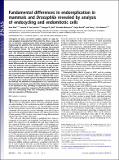Fundamental differences in endoreplication in mammals and Drosophila revealed by analysis of endocycling and endomitotic cells
Author(s)
Sher, Noa; Von Stetina, Jessica R.; Bell, George W.; Matsuura, Shinobu; Ravid, Katya; Orr-Weaver, Terry; ... Show more Show less
DownloadOrr-Weaver_Fundamental differences.pdf (2.024Mb)
PUBLISHER_POLICY
Publisher Policy
Article is made available in accordance with the publisher's policy and may be subject to US copyright law. Please refer to the publisher's site for terms of use.
Terms of use
Metadata
Show full item recordAbstract
Throughout the plant and animal kingdoms specific cell types become polyploid, increasing their DNA content to attain a large cell size. In mammals, megakaryocytes (MKs) become polyploid before fragmenting into platelets. The mammalian trophoblast giant cells (TGCs) exploit their size to form a barrier between the maternal and embryonic tissues. The mechanism of polyploidization has been investigated extensively in Drosophila, in which a modified cell cycle—the endocycle, consisting solely of alternating S and gap phases—produces polyploid tissues. During S phase in the Drosophila endocycle, heterochromatin and specific euchromatic regions are underreplicated and reduced in copy number. Here we investigate the properties of polyploidization in murine MKs and TGCs. We induced differentiation of primary MKs and directly microdissected TGCs from embryonic day 9.5 implantation sites. The copy number across the genome was analyzed by array-based comparative genome hybridization. In striking contrast to Drosophila, the genome was uniformly and integrally duplicated in both MKs and TGCs. This was true even for heterochromatic regions analyzed by quantitative PCR. Underreplication of specific regions in polyploid cells is proposed to be due to a slower S phase, resulting from low expression of S-phase genes, causing failure to duplicate late replicating genomic intervals. We defined the transcriptome of TGCs and found robust expression of S-phase genes. Similarly, S-phase gene expression is not repressed in MKs, providing an explanation for the distinct endoreplication parameters compared with Drosophila. Consistent with TGCs endocycling rather than undergoing endomitosis, they have low expression of M-phase genes.
Date issued
2013-04Department
Massachusetts Institute of Technology. Department of Biology; Whitehead Institute for Biomedical ResearchJournal
Proceedings of the National Academy of Sciences
Publisher
National Academy of Sciences (U.S.)
Citation
Sher, N., J. R. Von Stetina, G. W. Bell, S. Matsuura, K. Ravid, and T. L. Orr-Weaver. “Fundamental differences in endoreplication in mammals and Drosophila revealed by analysis of endocycling and endomitotic cells.” Proceedings of the National Academy of Sciences 110, no. 23 (June 4, 2013): 9368-9373.
Version: Final published version
ISSN
0027-8424
1091-6490